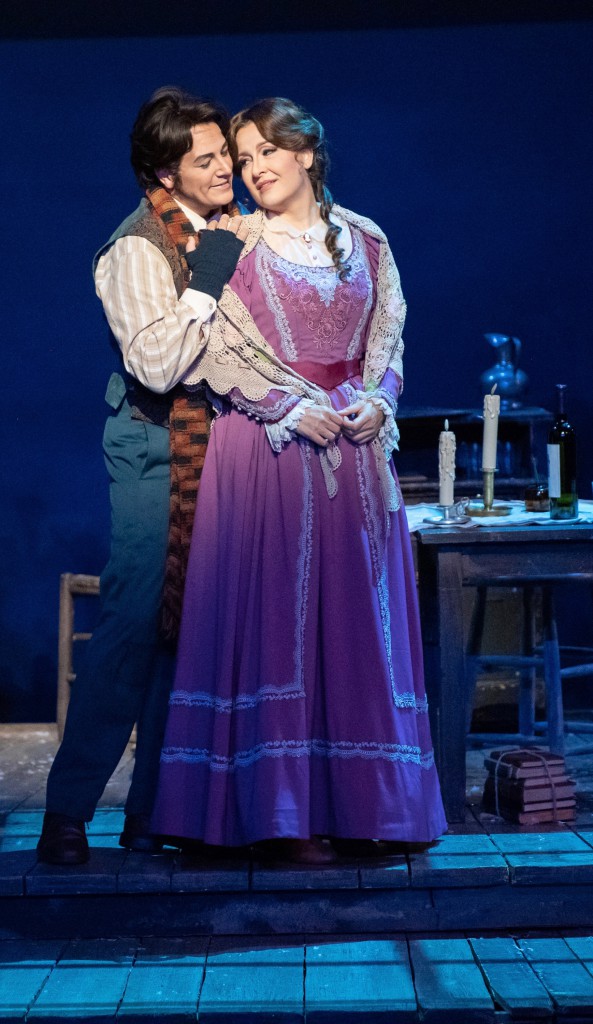Few vocal sparks in FGO’s bland “Bohème”

Adrienn Miksch and Alessandro Scotto di Luzio in Puccini’s “La Boheme” at Florida Grand Opera. Photo: Chris Kakol
Florida Grand Opera opened its 78th season Saturday night with a work that has probably generated as many tears and ticket sales as any opera in history.
The company’s production of Puccini’s La Bohème, which opened at the Arsht Center in Miami, is unlikely to rank with either its best or its worst of many productions of this opera. Two capable but unexceptional singers in the principal roles, a fine turn by an orchestra completely in its element and a brilliant performance in the role of Musetta made for a mixed account of the Italian classic.
The action in 19th century Paris unfolded on traditional sets provided by Michigan Opera Theatre, with an artists’ garret that was smaller and more cramped than usual, with its little stove and sparse furniture conveying poverty, hunger and cold. An imposing city wall and gate cast an effective gloom over Act 3.
By far the most effective segment of the opera was Act 2. The action takes place on a Paris square lined by buildings whose lighted upper-floor windows and advertising signs reached high above the stage. The square is crowded with street vendors and pedestrians, portrayed by a boisterous adult chorus and a children’s chorus whose crisp, tonally secure performance was cheered on by one or two noisily enthusiastic parents in the audience.
As Musetta, the beautiful on-again, off-again lover of Marcello, the soprano Jessica E. Jones gave the strongest performance of the evening, with a subtle interpretation of a role that rarely inspires singers to subtlety.
After she showed up at Café Momus, trailed by a hapless elderly admirer burdened with packages, she sat down and took over the scene. Her glances at her ex, Marcello, were alternately furious, flirtatious, anxious and gleeful—a cinematically shaded range of emotions as her displays of vanity and vulnerability worked their spell over him.
She gave a graceful, sweet-toned, account of her famous waltz, “Quando m’en vo’,” tossing her shawl backward onto Marcello’s face just as she brought the aria to its soaring climax, a perfectly timed moment in which music and comedy came together.
The singers in the principal roles of Mimì and Rodolfo were less successful. There was a blandness to their portrayals of the two lovers, with a lack of passion in both their stage presences and vocal performances. Both acted in a restrained manner, which is fine in an art form that usually errs in the other direction these days. But the music cries out for greater intensity and the singing proved uneven throughout.
As Rodolfo, the Italian tenor Alessandro Scotto di Luzio was at his best in his conversational moments with Mimì, where his warm, smooth sound and on-target intonation allowed him to create moments of romantic intimacy. Climactic passages, however, such as the top notes of “Che gelida manina” or “O soave fanciulla,” came off less well; he seemed to scoop up to high notes, lacking the confidence and definition to register the big moments of soaring passion.
As Mimì, the soprano Adrienn Miksch sang with sweetness and delicacy in her opening aria, “Sì, mi chiamano Mimì.” But at the climax, as she sings of the sun’s rays pouring into her tiny room, her voice became shrill and hard-edged, rather than soaring. In Act 3, as she tries to part with Rodolfo, the appealing delicacy of her voice came through again, as she said they should separate without hard feelings. But as with Rodolfo, there was a lack of personality and the vocal gleam needed to bring off the big moments.
The composer gives a big role to the orchestra, and under conductor Ramón Tebar, the FGO ensemble delivered, putting the music over with impassioned, arching lines and a real Puccini luster.
Except for a few out-of-tune spots in exposed string passages, the orchestra rose to the scores challenges and provided great moments – the shimmering string tones at Mimì’s entrance, the suggestive Act 1 music—where the words say Mimì and Rodolfo are looking for a key and the music says they’re falling in love—and the warm wind playing that accompanied their final reminiscences of their first meeting.
The roles of Rodolfo’s three friends can inspire grade-Z clowning and mugging. Although the plot calls for some of this, director Jeffrey Marc Buchman and the three singers kept it at a level that evoked youthful high spirits rather than jarring cloddishness.
As Marcello, the biggest role of the three, the baritone Trevor Scheunemann brought to the performance a rich, authoritative voice that gave sturdy musical and emotional support to Rodolfo and Mimì in his duets with them.
As Schaunard, the baritone Benjamin Dickerson brought a light touch and feel for comedy to his hapless attempts to brag to his indifferent friends how he produced a bounty of food. And as Colline, the bass Simon Dyer brought an unusually lyric tone and sense of style to the usually dolorous aria in which he says farewell to the coat he’s about to pawn to help Mimì.
The bass Tony Dillon did a fine job as the butt of the rest of the cast’s jokes in the twin comic roles of Benoît and Alcindoro.
La Bohème runs through November 11 at the Arsht Center for the Performing Arts in Miami and Nov. 15 and 17 at the Broward Center for the Performing Arts in Fort Lauderdale. fgo.org
Posted in Performances
Leave a Comment
Sun Nov 4, 2018
at 11:20 am
No Comments